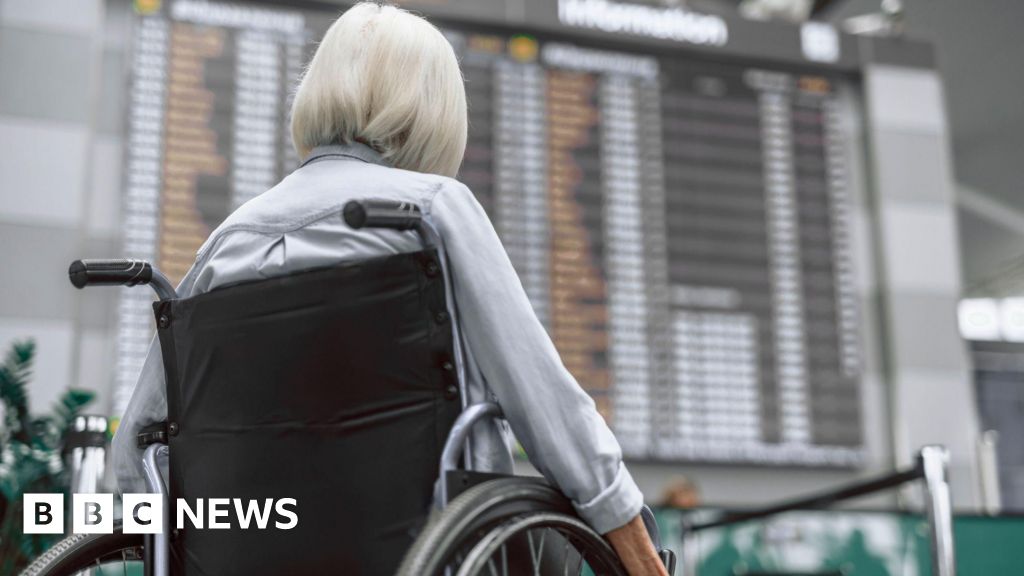Call to end airport drop-off fees for blue badge holders
- BBC News
All UK airports should stop charging blue badge holders for being dropped off close to terminals, a disability charity has said.
Several people with blue badges got in touch with the BBC following news that more than half of the busiest airports had raised the so-called "kiss-and-fly" fees to as high as £7 in some cases.
Many airports already offer discounts or waive the fee for disabled drivers, but blue badge holders say the system is complex and inconsistent.
Graham Footer, chief executive of Disabled Motoring UK, said some airports have "allowed greed to cloud their judgement", and argues people with disabilities should not have to pay the charge at all.
"Disabled customers deserve to be treated with respect and dignity and not fleeced as soon as they arrive," he said.
The BBC contacted the 20 busiest airports in the UK to confirm their policy on drop-off charges for blue badge holders.
London City does not charge drop-off fees for any kind of passenger.
Gatwick, Birmingham, Edinburgh, Heathrow, Liverpool John Lennon and Manchester all charge a drop-off fee, but blue badge holders do not have to pay it.
Luton, Glasgow, Belfast International, Belfast City, East Midlands, Aberdeen, and Southampton all charge blue badge holders the same as other passengers for using the drop-off spaces closest to the airport. But they also all offer separate free drop-off parking specifically for blue badge holders elsewhere.
For Glasgow and Aberdeen, this parking is only free if blue badge holders are being dropped off by family or friends - not if they are dropped off by taxi.
All airports offer free drop-off options further from the terminals for all passengers - not just blue badge holders - such as "park and ride" facilities where people can leave their car and take a bus to the airport.
Bristol, Leeds Bradford, and Bournemouth all charge blue badge holders for drop off but allow them to stay for longer than other passengers at a lower fee.
Bristol charges £7 for 40 minutes, Leeds Bradford charges £7 for 60 minutes, and Bournemouth charges £5 for four hours because it said disabled passengers "may require more time".
Only Cardiff, Newcastle, and Stanstead charge the same fee with no discount at all.
Cardiff charges £3 for 10 minutes, Newcastle charges £5 for 10 minutes, and Stanstead charges £7 for 15 minutes.
Airports UK, which represents the industry, said that the best accessible drop-off for blue badge holders depends on the layout of the airport.
"No one option is ideal at all airports, so to optimise access at each airport the offer will necessarily be different," it said.
It advised passengers to check the airports website before travelling to identify the best drop-off location.
Most of the airports that waive drop-off fees do so if a disabled driver shows their blue badge at the airport on the day.
However, for Heathrow and Liverpool, the exemption needs to be claimed online or on the phone either before or after travelling. Heathrow says its online process for confirming blue badges can take five days to complete, though it told the BBC it usually takes 48 hours.
James Williams, 67, from London finds these services difficult to use.
"I am a blue badge holder and I have to pay because I am not computer literate," he says, arguing that "you have to jump through hoops to get this discount".
Jonathan Cassar, 51, from London says the complex nature of online registration means that "disabled people who need to be dropped at terminal cannot be spontaneous as others can".
Heathrow said it had tried to make the blue badge registration process "as simple as possible" and advised anyone who needs registration urgently to get it approved over the phone.
Liverpool said it had introduced online confirmation "to minimise abuse of the blue badge system".
Not all blue badge holders feel being charged for airport drop off is unfair.
Gordon Richardson, chair of the British Polio Fellowship Board, is a blue badge holder but says he is "not against the principle" of disabled people paying the same as non-disabled people.
He says what is most important is that the space is accessible and easy to use.
He urges blue badge holders to contact airports before travelling so that the airports can have the staff ready to help them and ensure they get their discount or free parking.
Many of the airports the BBC contacted said their blue badge policies had been drafted in consultation with disability groups and with special consideration for their needs.